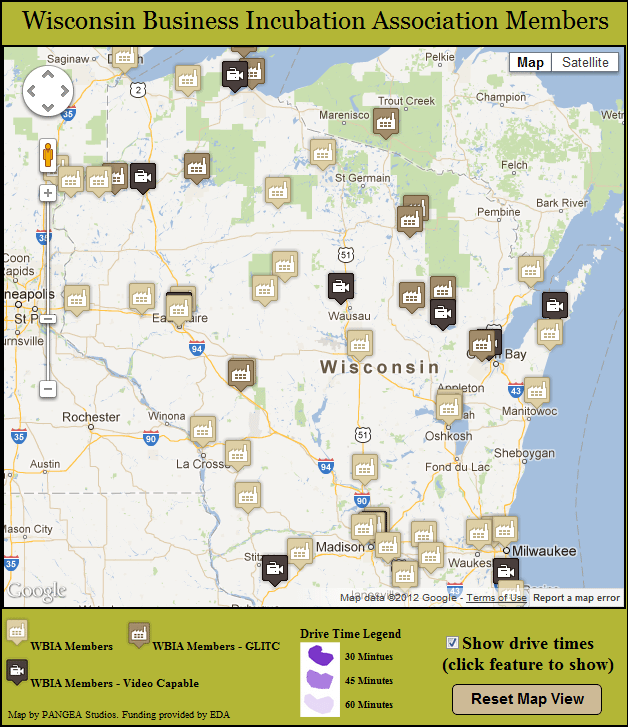Incubators Play Crucial Role in Earliest Stage of Business Startup
We’ve all heard of the inventor or scientist with a great idea that leads to a wildly successful and profitable company. But how does it happen? After all, it takes money, sweat equity, business acumen, partners and a bit of luck.
Enter the business incubator, which provides the environment and support to help hatch a great idea and nurture its evolution.
What’s an incubator?
Business incubators are physical facilities that offer programs, shared services and business consultation. (Though, a few virtual incubators exist in Wisconsin.) They typically offer space below market rates as well as access to shared equipment and basic business services. Many incubators offer accelerator-type opportunities to link entrepreneurs to seed capital, but it isn’t a necessary component.
“We help entrepreneurs, from the very beginning, get their business idea to the next level where they can add employees and find a permanent place in the community,” says Ed White, president of the Wisconsin Business Incubation Association (WBIA) and director of the Platteville Business Incubator. “As such, we’re a primary deliverer of job creation.”
Incubators are organized in various ways, depending on local needs. Most leases are three to five years to allow a startup to establish cash flow and build a management team. Typically, policies lay out available services and agreement terms, including “graduation” requirements. Some incubators, like Northwest Regional Planning Commission, offer flexible space so startups can secure more space as they grow while staying in an incubator setting.
Developing experts across the state
WBIA formed in 1998 to offer training, networking and support for incubator directors and others who nurture entrepreneurship. WBIA has more than 70 members, including 33 active incubators across the state.
“The biggest determination of incubator success is management, and our association provides leaders with the technical assistance they need, including best practices and lessons learned,” White says. “Our job is to help incubators create business, wherever it happens to be, throughout the state of Wisconsin.”
WBIA is the only state association offering a national business incubation management certification to its members. With federal funding, 11 have already earned certification and eight more are in process.

“Growth Wheel allows us to map the needs and challenges of a new business, and, if I don’t have a lot of previous experience in its industry, I can talk with other business startup experts outside of my region, because we’re all speaking a common language,” says Therese Fellner, director of business development at Gateway Technical College.
WBIA, with a grant from WEDC, has already trained 14 members on the tool. Another workshop is set for May 2013, in partnership with the UW-Extension and Small Business Development Centers.
“Because many WBIA members collaborate and share facilities with regional SBDCs, this allows us to literally and figuratively be on the same page,” Fellner says.
She adds that support from WEDC has helped the organization better serve its members, including offering video-conferencing for WBIA meetings and workshops. “We’ve transitioned from being a grantee to being a partner, which is pivotal from an economic development standpoint,” she says.
UW incubator offers variable leases, specialized lab equipment
MGE Innovation Center began in 1999 as an arm of the University Research Park to commercialize UW science and technology. It now houses 30 companies, with room to grow.
The center provides faculty and graduates with the chance to commercialize their research. A venture often starts with two researchers leasing lab space and accessing shared services for a few months to refine their technology. If they reach certain milestones, they may move into larger space and stay up to five years as they launch their company.
“We support them through all of their stages of growth,” says Greg Hyer, associate director of University Research Park. “We offer them what they need so they can operate in a plug-and-play mode, spending time on research and enhancing their technology, not on facility and infrastructure issues.”
The center offers specialized air handling and shared lab equipment for science startups, mega-high-speed Internet for software companies, and access to UW’s library system to monitor the patent and licensing landscape. In addition, with Wisconsin Angel Network and BioForward located nearby, they have the opportunity to make important connections in the investment and entrepreneurial community.
Hyer says the center gives preference to UW-Madison initiatives with a science and information technology focus, but other startups are also eligible.
“We interview them to find out where they are in the development cycle to ensure a high probability for growth in the near term and that they can utilize the services we offer. We commit for a year, but they can leave earlier if needed. We understand the entrepreneurial mindset, so agreements are flexible.”
Flexibility and support is key
Stratatech proves the need for flexibility. The company developed a synthetic skin graft material and has remained a tenant of MGE Innovation Center for 10+ years while securing federal funding and beginning clinical trials. During this lengthy process, leaders always needed flexibility because a major roadblock could have killed the project.
“They stayed longer than we initially thought, but we understood their timeline and milestones, so we needed to adapt our expectations for lease duration to their needs,” he says. “Ultimately our goal is to create successful companies with a solid employment base, and we keep that end goal in mind.”
In addition to being flexible, Hyer says organizations focused on growing new businesses in Wisconsin need to nurture entrepreneurship and support risk-taking by ensuring everything is in place to get a company to market.
“We need to all work together for the future of our state. Creating new kinds of jobs in Wisconsin will take time, patience and public and private involvement to put it all together.”
For more information
Wisconsin Business Incubation Association
Ed White
President
608.348.2758
http://www.wbiastate.org/
Gateway Technical College
Therese Fellner
Director of Business Development
262.898.7524
http://www.gtc.edu/
MGE Innovation Center
Greg Hyer
Associate Director
608.320.03243
http://www.universityresearchpark.org/
Wisconsin Economic Development Corporation
David Volz
Entrepreneurship Program Manager
608.210.6773







